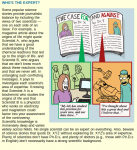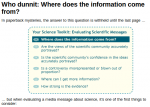Possible biological effects of non-ionizing radiation
- Login o registrati per inviare commenti
This is a continuation of an off-topic discussion that started here in Trisquel-users:
https://trisquel.info/en/forum/newbie-trying-load-trisquel-acer-computer#comment-130593
I made my first contribution to that off-topic thread here:
https://trisquel.info/en/forum/newbie-trying-load-trisquel-acer-computer#comment-130701
onPon responded to that comment here:
https://trisquel.info/en/forum/newbie-trying-load-trisquel-acer-computer#comment-130707
onPon:
"190 is a very small number ... What matters is what their research shows."
The only relevance of the number is that it is greater than 0, and that they have all published peer-review papers on the issue. The only way to know what their research shows, and if it stacks up, is to have a look at the abstracts of the papers, and see if you can find any rebuttal in other peer-reviewed papers. This is called a literature review, and it's the minimum you have to do before you can hold any view on a subject that isn't simply a confirmation bias.
"I don't see why I should trust what an electrical engineer or psychologist says about the science of electromagnetic radiation."
Isn't that a bit like saying "I don't see why I should trust what a geologist says about the science of climate change"? As it happens, geologists have contributed many important papers to the understanding of ice core samples and other geological evidence about the Earth's climactic history. In fact, scientists from many different fields outside meteorology have contributed to the consensus on anthropogenic global warming. Hyper-specialized scientists in isolated silos is a quaint, 19th century, gentleman's club version of how science works, and of academia in general. Cross-disciplinary research is very much the norm these days.
"[the petition] fails to reference a single one of these "numerous recent scientific publications"
It's a petition, not a peer-reviewed paper. In the 'Science and Policy' menu on that site, there is a page called "EMF science and policy developments", which provides a link to a site where you can search a database of papers published on EMF-related topics. This presumably includes the papers by each of the scientists who signed that petition:
https://www.emf-portal.org/en
Failing that, you could just web search each scientist's name and "EMF" and "peer-reviewed paper" and see what you can find?
"Perhaps you are familiar with them?"
I've been aware for years of scientists who have expressed concerns about the health effects of EMFs, but it's an area I haven't looked into too deeply yet. Perhaps this discussion could be an opportunity to do so? For the record, I very much hope the fears about EMF health effects are wrong, but it is precisely because I recognise that confirmation bias, that I make an effort to seek out disconfirming evidence for that view.
> The only way to know what their research shows, and if it stacks up, is to have a look at the abstracts of the papers
Yep, that's why I asked for a link, so I can look at them. I'd still like that link if you have it.
At the very least, I need to know the title of the paper, author, date of publication, and the journal it was published in.
> As it happens, geologists have contributed many important papers to the understanding of ice core samples
As I said, it doesn't matter who they are. What matters is what their peer-reviewed research published in respected peer-reviewed scientific journals shows. I wouldn't expect an electrical engineer to publish any scientific research at all, let alone scientific research in the field of health or biology. But if these electrical engineers and psychologists truly have published such peer-reviewed research in respected scientific journals (as you say they have), then of course said research should be taken seriously. But I'd need to know what paper we're talking about to discuss it with you.
> Hyper-specialized scientists in isolated silos is a quaint, 19th century, gentleman's club version of how science works
Hm? I'm pretty sure specialization has increased in recent history, not decreased. In any case, it doesn't really matter. I'm not going to reject peer-reviewed research published in a respective scientific journal based on who did the research. That would be fallacious. As long as the research was done properly (and respected scientific journals ensure that it is through the peer-review process), it's good research, whether it was done by a scientist in that field, an engineer, the Joker, or anyone else.
> In the 'Science and Policy' menu on that site, there is a page called "EMF science and policy developments", which provides a link to a site where you can search a database of papers published on EMF-related topics. This presumably includes the papers by each of the scientists who signed that petition:
Odd, because all the studies I'm finding listed there say nothing at all about electromagnetic radiation doing anything to biological organisms. Almost all of them are about electricity and magnetic fields, and one is about effects electromagnetic radiation can have on machinery (pacemakers). Of course I didn't look through the entire list, just a couple pages, but clearly this is not a useful resource if it has so many irrelevant links.
> Failing that, you could just web search each scientist's name and "EMF" and "peer-reviewed paper" and see what you can find?
Would it not be easier for you, who is clearly already familiar with the research you're talking about? You did say that all 190 signatories of that petition have peer-reviewed research demonstrating what you're talking about; that tells me you know of hundreds of such papers, whereas I know of none.
Besides, I'm not making the claim here. They (and you) are. If I told you that scientific research shows that the color red causes eye cancer, then told you when you ask to see the research I'm talking about to just look it up yourself, would you consider that to be reasonable?
- Login o registrati per inviare commenti



